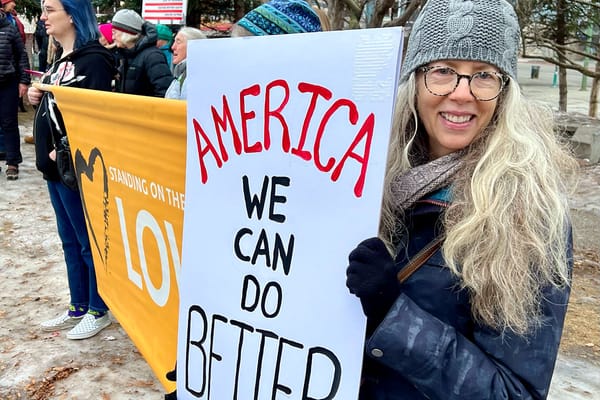Unite. Resist. Prevail.

How Unity Defeats Tyranny
"If you want to walk far, walk together." — Mahatma Gandhi
The power lies with the people. It always has. The more people—the more power. Far more than any tyrant—though this is knowledge they try to keep from you.
We are currently facing a democratic existential crisis. Just this week alone, there was unlawful access into systems containing our personal data granted to a private citizen, mass and inhumane deportations, and attacks on federal programs that alleviate suffering and sustain lives. These are all acts of tyranny.
It is crucial to realize—and I cannot stress this enough—that no single person, government official, institution, or charismatic leader will suddenly appear to save the day. The responsibility falls on us, first as individuals and then as members of our communities, to answer the call to defend our way of life.
Now more than ever, we need to lean in and draw strength from each other for the work ahead. It’s time for even the most devout introverts to step outside their comfort zones and form connections. If you don’t already have a social network of like-minded individuals, there are plenty of ways to find one. Participating in a special interest group—a book club or hiking group—is a great place to start. Volunteer, or attend a political rally.
Wherever you find them—and you don’t need many—make yourself part of a tribe or invite others to join yours. Henceforth, I refer to these groups as TENs (Tyranny Elimination Networks). The acronym also implies the number ten, which is a good minimum number of members.
Not everyone in a TEN needs to be ideologically aligned. In fact, the more diversity, the better. It challenges members to appreciate different perspectives and develop deeper bonds of trust. The only requirement is agreement on this core principle: overcoming tyranny.
A TEN should meet or check in regularly, at least once a week—not just for activism, but for all the joys and benefits of community, which make life meaningful and bring out the best in humanity. As Alexandria Ocasio-Cortez says:
"We have to sustain each other. Making joy isn’t denial; it’s how we will survive."
If you are geographically isolated, plan to connect digitally. Whether in person or online, share news and information. There are many platforms available for this—encrypted messaging apps, Zoom, Reddit, Bluesky, and others. Even when meeting face-to-face, utilizing these digital channels can amplify messaging and strengthen connections.
No matter the method, the goal is to provide support, care, and encouragement. Get to know one another as friends and neighbors would. When sharing in groups, take turns talking and listening. If someone expresses a view different from your own, be curious rather than confrontational. Establish protocols for resolving inevitable conflicts—First Nations' traditions around community relations and communication offer a wealth of guidance in this realm.
Many perspectives can coexist, as long as no one’s actions harm others. Keeping an open mind is essential, and above all, remember—you are allies in a common cause.
Strong communities offer safety, boost morale, and inspire the courage to act. They help members do things they might not otherwise do alone. Most importantly, in times of crisis, a small, prepared group can quickly mobilize, join forces with other groups, and form coalitions capable of deploying effective responses. (I’ll cover specific strategies and measures of success in the next post.)
Another reason small resistance groups are essential is that they serve as the building blocks of a diverse and agile network of civil resistance organizers. In earlier movements, there was often a single, dynamic leader who shared a vision, outlined a plan, and inspired the masses in accomplishing a goal within a cause—two of the most notable being Mahatma Gandhi’s leadership in the Indian independence movement and Martin Luther King Jr.’s role in the Civil Rights Movement. While both of these leaders were admirable and profoundly effective, history has shown that charismatic figures can be discredited or tragically cut down, leaving movements vulnerable.
A safer, more effective approach to organizing activists today is through a decentralized structure—and this is where a network of small groups excels. By establishing many TENs across the nation and cultivating numerous capable leaders within diverse NGOs dedicated to safeguarding democracy and civil liberties, we create resilience. These leaders coordinate with one another, providing actionable guidance to TENs while maintaining the flexibility to adapt as needed.
This structure makes it difficult for any tyrant to dismantle the movement by targeting a single leader or group. If one is suppressed, others are ready to step up and carry the baton.
The collective power of a network of small groups working in unison across the nation—like drops of rain filling streams, merging into rivers, and flowing into the ocean—can overwhelm even the most oppressive forces. While tyrants may resort to violent oppression, hoping to make an example of a few to intimidate the many, such tactics often backfire. The use of violence frequently galvanizes broader support for the opposition, both domestically and internationally.
This kind of civil resistance movement grows organically. As others witness acts of courage and solidarity, they are drawn in. No one is immune to the arbitrary cruelty of a tyrant, and eventually, everyone feels its impact. When they do, many will defect and join the opposition, especially if the movement maintains nonviolent discipline.
The good news is, according to a notable study on nonviolent movements:
"165 out of 167 nonviolent campaigns between 1945 and 2014 succeeded when they achieved participation of 3.5% or more of a society’s population. In fact, many nonviolent campaigns succeeded with smaller levels of participation."— Erica Chenoweth, “Questions, Answers, and Some Cautionary Updates Regarding the 3.5% Rule,” Carr Discussion Paper Series, 2020-05 (Harvard Kennedy School, 2020)
The pathway to success is within reach—if we stay focused and persevere.
Remember A tyrant’s goal is to divide and conquer. The dissident’s goal is to unite and prevail.
Actionable Items:
- Join or start a TEN.
- Meet or check in at least weekly. Build bonds of trust.
- Align your TEN with a nonprofit, non-governmental organization (NGO) that supports democracy and civil liberties, such as MoveOn, NAACP, or ACLU.
- Be prepared to respond to calls to action from your NGO and participate in civil resistance strategies.
Up Next: Civil disobedience strategies and tactics.





